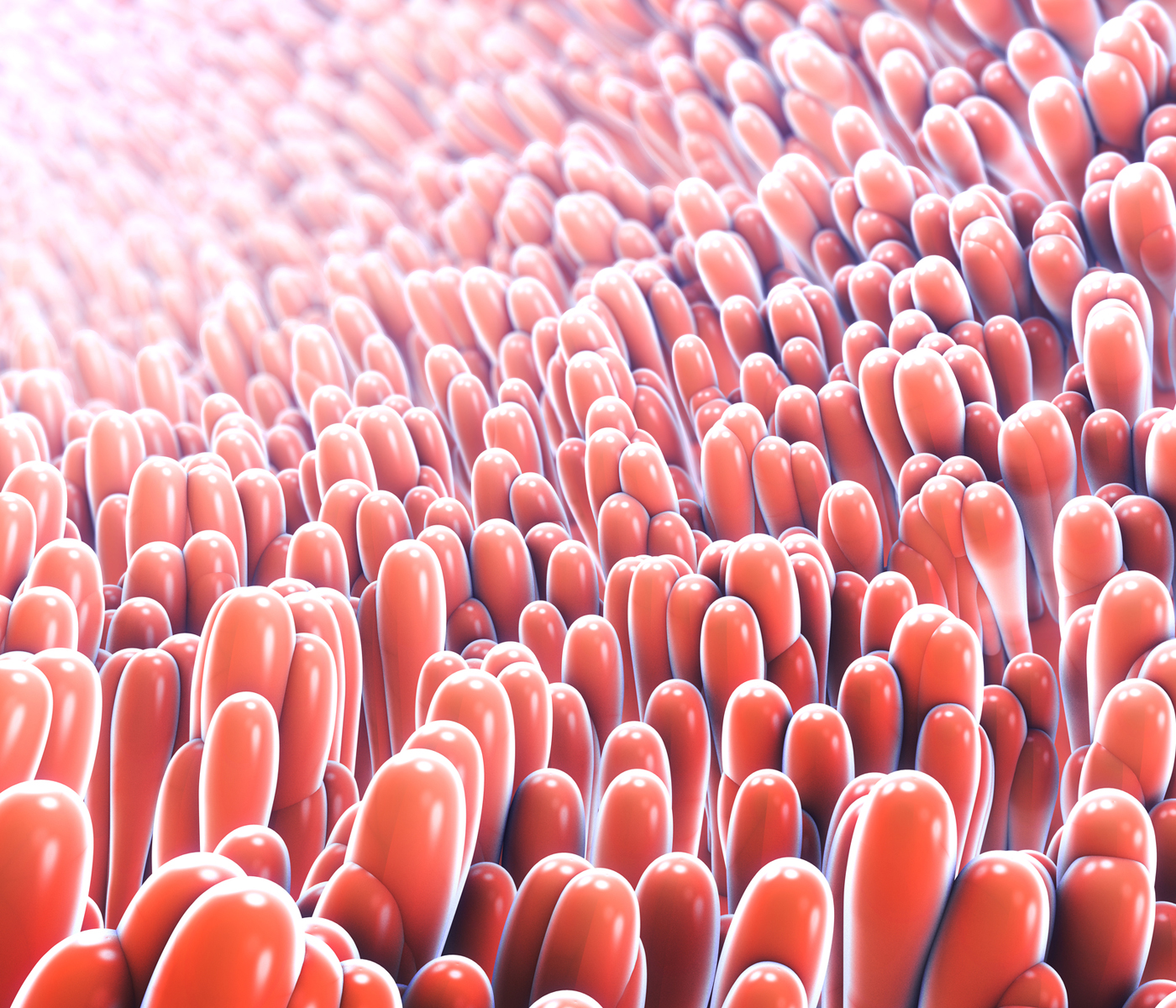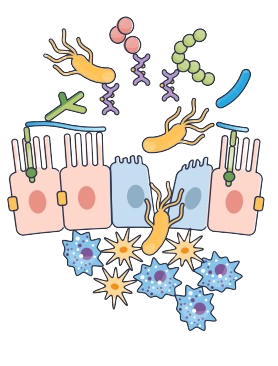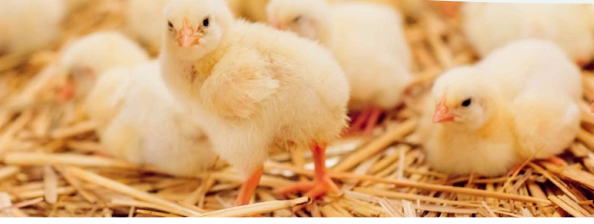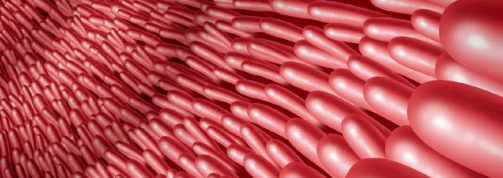 28 Feb 2024
28 Feb 2024
Gut health improvement strategies for successful nutritional efficiency in monogastric livestock
|
Maintaining a healthy digestive system is crucial for an effective nutrient processing, which directly impacts productive performance. |
Genetic lines of high-performing monogastric animals often face gut health problems due to their high feed intake and intensive production systems, which stress their digestive physiology.
Excess of undigested nutrients can cause “dysbiosis”, a microbial imbalance that alters the composition of the gut microbiota.

Dysbiosis, along with other stress factors such as environmental changes and technical procedures, trigger inflammation and compromise the integrity of epithelial cell junctions. This, in turn, results in increased intestinal permeability (Dukatelle R. et al, 2023).

Understanding the interactions between these various characteristics highlights the wide range of aspects related to digestive health and its impact on animal production.
| In this context, gut health is defined as the absence or prevention of diseases that enable the animal to carry out its physiological digestive functions and resist external and internal stressors.. |
The gut microbiota refers to the collection of microbial communities that inhabit an animal’s gastrointestinal tract mucosal surfaces (Guarner F, 2003). It is primarily composed of anaerobic bacteria and performs crucial functions, including:
![]()
Feed digestibility: They convert complex carbohydrates into short-chain fatty acids such as butyric acid (an essential nutrient for enterocytes), contributing to improvements in average daily gain and feed conversion ratio.
![]()
Protection against invasion by enteric pathogens.
![]() Immunomodulation.
Immunomodulation.
![]()
Assists in the breakdown of harmful compounds or metabolites present in the diet.
![]()
Synthesis of various substances, including B vitamins, vitamin K, amino acids, short-chain fatty acids, and lactic acid, which acidifies the intestinal lumen.
(Yadav and Jha 2019; Aggeletopoulou et al. 2019; Rinttilä and Apajalahti 2013)
Impact of gut microbiota on animal performance and health:

The gastrointestinal tract is crucial for animal digestion and immunity. Its proper functioning depends on the intestinal microbiota, which must be balanced and constantly changing.
The microbial populations composing the gut microbiome vary depending on its location within intestinal tract, the animal’s age, and the pathophysiological condition. The gut microbiota has a significant impact on metabolic processes, such as the ability of certain bacteria to break down dietary components like cellulose and resistant starch (Adedokun, 2019).
![]() Bacterial fermentation plays a crucial role in producing short-chain fatty acids (SCFA) that serve as food for enterocytes, regulate intestinal blood flow, mucin production (protective agent against mucosal damage), and intestinal immune responses.
Bacterial fermentation plays a crucial role in producing short-chain fatty acids (SCFA) that serve as food for enterocytes, regulate intestinal blood flow, mucin production (protective agent against mucosal damage), and intestinal immune responses.

Some strains of Lactobacillus spp. produce short-chain fatty acids (SCFAs) and bacteriocins that have bacteriostatic or bactericidal properties. These compounds work by either lowering the pH or modifying receptors against pathogenic microbes. It is important to note that this information is based on objective research findings and not subjective evaluations.
Several factors influence the maintenance of gut health (Linden, J. 2013):

Among these factors, the diet has been identified as the most influential in shaping the composition of the gut microbiota and maintaining its balance.
| Therefore, this article will explore nutritional strategies to improve gut health and animal performance |
 Global concerns regarding the use of antibiotics for growth promotion in livestock farming have resulted in a ban on antibiotics in the European Union. The United States and other countries are also reconsidering their use, following this strategy (World Health Organization, 2017).
Global concerns regarding the use of antibiotics for growth promotion in livestock farming have resulted in a ban on antibiotics in the European Union. The United States and other countries are also reconsidering their use, following this strategy (World Health Organization, 2017).
 Current research is focused on finding sustainable alternatives to antibiotics for animal production from a feed perspective. |
Organic acids

Organic acids are compounds commonly found in plant and animal tissues. They were previously used as preservatives to prevent spoilage and increase the shelf life of food due to their ability to control microbial contamination.
This group includes acids such as lactic, acetic, propionic, and butyric acids, among others. Additionally, they play a beneficial role in gut health (Suiryanrayna et al., 2015).

Organic acids have sparing effect to some enzymes, for example by lowering the pH of the chyme, may be increased the activity of pepsin.
 They also have the ability to reduce the presence of pathogens such as enterobacteria or Salmonella spp. (Saki AA et al, 2012). Supplementation with organic acids can affect the balance of bacterial cell membranes, macromolecules, and nutrient transport, leading to their destruction.
They also have the ability to reduce the presence of pathogens such as enterobacteria or Salmonella spp. (Saki AA et al, 2012). Supplementation with organic acids can affect the balance of bacterial cell membranes, macromolecules, and nutrient transport, leading to their destruction.
The efficacy of organic acids depends on their dissociation capacity and hydrophobicity, so it is important to supplement with adequate amounts to avoid detrimental effects against the organism’s own cells.

Botanicals

The most innovative trend among animal nutrition companies has been to incorporate plant-derived ingredients with historically studied and well-known properties, as reported in scientific literature, for the control of intestinal dysbiosis or the improvement of zootechnical parameters.
Botanicals contain various types of compounds, including polyphenols, alkaloids, terpenoids, organic sulphur compounds, and nitrogenous compounds. These compounds are classified based on their polycyclic aromatic rings.
Polyphenols are the largest group and have been extensively studied for their ability to reduce inflammation.This is due to their capacity to scavenge oxygen free radicals that arise in cellular oxidation processes. Additionally, they have growth-stimulating properties for saprophytic microbial growth.
For example, in a study conducted on 7-day-old chicks, an increase in the population of acid lactic acid bacteria was demonstrated, as well as a reduction of pathogenic microbiota (Viveros A, et al. 2020).

 The phytogenic compounds’ ability to regulate intestinal dysbiosis has been studied in monogastric animals. They have been found to increase the quantity and diversity of several beneficial bacterial species while decreasing the abundance of opportunistic bacteria. |
How is this achieved?
This is achieved through the hydrophobicity of plant derivatives, which allows them to penetrate the bacterial wall, causing a disruption that increases permeability and releases intracellular bacterial material. Bacterial cytoplasmic membranes consist of phospholipids and proteins.
![]() When exposed to botanical agents, some of these proteins are denatured, including those involved in energy generation. Additionally, other compounds cause oxidative stress to the bacteria by oxidizing the outer membrane, ultimately leading to their destruction.
When exposed to botanical agents, some of these proteins are denatured, including those involved in energy generation. Additionally, other compounds cause oxidative stress to the bacteria by oxidizing the outer membrane, ultimately leading to their destruction.
| Botanicals are often administered together with organic acids as they can act synergistically. This is because some botanicals can alter the bacterial membrane, making it permeable to organic acids. These organic acids can then interact with the genetic material of the bacteria, increasing their killing power (Rifat Ullah Khan et al, 2022). |
Probiotics & prebiotics
 Finally, some premixes and complementary feeds include probiotics and prebiotics in their compositions. Probiotics are non-pathogenic microorganisms that, when administered in adequate amounts, benefit intestinal and general health.
Finally, some premixes and complementary feeds include probiotics and prebiotics in their compositions. Probiotics are non-pathogenic microorganisms that, when administered in adequate amounts, benefit intestinal and general health.
 The microorganisms used include lactic acid bacteria, bifidobacteria, fungi, and live yeasts. Probiotics promote competitive exclusion, intestinal maturation, regulate the immune system, and improve metabolism and growth. The microorganisms used include lactic acid bacteria, bifidobacteria, fungi, and live yeasts. Probiotics promote competitive exclusion, intestinal maturation, regulate the immune system, and improve metabolism and growth. |
However, it should be noted that the effect of strains and their administered amount may vary. Several studies have found that a combination of multiple strains may be more effective than a single strain. Furthermore, they can influence the diversity of the gut microbiota and enhance the immune response.
On the other hand, prebiotics are non-digestible ingredients that selectively affect the composition and metabolism of the gut microbiota. They promote the growth of beneficial bacteria and reduce harmful ones.
| When used in combination with probiotics, prebiotics such as fructooligosaccharides (FOS) and mannanoligosaccharides (MOS) can have synergistic effects on gut health and poultry performance (Yadav, S, 2019). |
The implementation of these strategies enhances nutritional efficiency, which refers to the digestion and absorption of nutrients from the raw materials, resulting in improved zootechnical performance.This, in turn, leads to greater economic benefits in production scenarios.


CONCLUSIONS 
| LIPTOSA encourages the general public and animal production experts to learn more about compounds with a strong scientific basis that have demonstrated visible benefits in the short, medium, and long term.
These compounds can improve economic profitability on farms, animal welfare, and public perception by reducing the use of antibiotics and synthetic ingredients. |
You may also like to read: “Exploring the Potential of Cannabis in Poultry Nutrition”
Subscribe now to the technical magazine of animal nutrition
AUTHORS

Nutritional Interventions to Improve Fertility in Male Broiler Breeders
Edgar Oviedo
The Use of Organic Acids in Poultry: A Natural Path to Health and Productivity
M. Naeem
Synergistic Benefits of Prebiotics and Probiotics in Poultry, Swine, and Cattle
Gustavo Adolfo Quintana-Ospina
Hybrid Rye Potential in Laying Hen Feed Rations
Gwendolyn Jones
A day in the life of phosphorus in pigs: Part I
Rafael Duran Giménez-Rico
Use of enzymes in diets for ruminants
Braulio de la Calle Campos
Minerals and Hoof Health in the Pregnant Sow
Juan Gabriel Espino
Impact of Oxidized Fats on Swine Reproduction and Offspring
Maria Alejandra Perez Alvarado